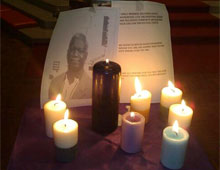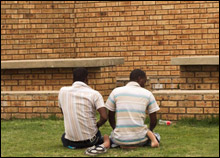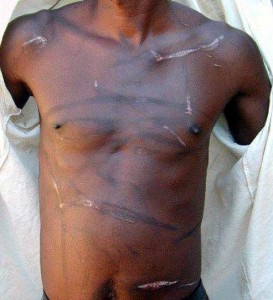
Report Cover Photo: Victim of violence, Presidential election campaign, Mberengwa East, January 2002
Five years ago this June, parliamentary elections were held in Zimbabwe. Both the ruling Zimbabwe African National Union – Patriotic Front (ZANU (PF)) and the opposition Movement for Democratic Change (MDC) fielded candidates in all of the 120 constituencies. When the results were announced, ZANU (PF) was declared the winner of sixty-two of the constituencies, while the MDC won fifty-seven of the constituencies.5 The MDC, however, alleged that the elections were marred by, inter alia, widespread violence and voter intimidation, and in accordance with Zimbabwe’s electoral law, challenged the election results in thirty-nine of the constituencies. (Read more…)
Tue, March 15 2005 » Human rights, Impunity of the State, Justice system, Reports » Leave a comment
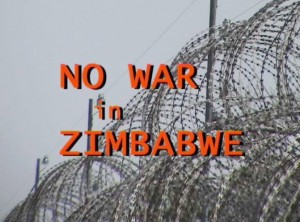
Report Cover Photo: Razor wire on the border between Zimbabwe and South Africa
Zimbabweans are now the second biggest group of foreign Africans in South Africa. Yet there is little formal information available on their situation. Very few are being officially recorded as political refugees. Some Zimbabweans claim that it is hard to access asylum seeker status. It was the intention of the authors to investigate these allegations, as well as to establish other problems and issues of relevance to Zimbabweans in South Africa. (Read more…)
Mon, November 15 2004 » Diaspora, Human rights, Reports » Leave a comment
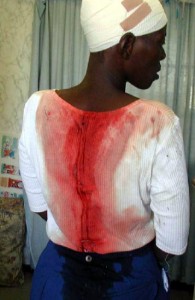
Report Cover Photo: Woman beaten by police during peaceful demonstration called by ZCTU on 18 November 2003: Bulawayo.
The last four years have seen a relentless clampdown on all those who are perceived as opposing the ruling party, ZANU-PF. State repression has relied on key new pieces of legislation that give the state almost unlimited powers against its own people. It is two years since the most draconian act in Zimbabwe’s 24-year history was passed into law – the Public Order and Security Act (POSA). Since it was passed in January 2002, POSA has been used weekly to silence democratic voices, and hundreds have been arrested in terms of its clauses. With a general election constitutionally bound to take place within the next year, it is essential to review the state of democracy in Zimbabwe at this time, and to identify those aspects that will rule out from the onset the possibility of any election being free and fair. It is clear that the POSA is a powerful, anti-democratic weapon that has been and will continue to be used against alternative voices in Zimbabwe. POSA rules out almost every democratic activity, including the rights to freedom of speech, opinion and association. (Read more…)
Thu, July 15 2004 » Human rights, Impunity of the State, Justice system, Reports » Leave a comment
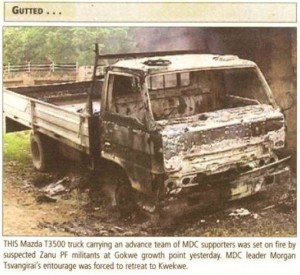
Report Cover Photo: Truck carrying MDC supporters set on fire by suspected Zanu PF militants
In association with The Zimbabwe Institute
Zimbabwe is on the eve of an election year: the nation is constitutionally bound to have general parliamentary elections before June 2005. Any interim agreement resulting from talks between the ruling Zimbabwe African National Union – Patriotic Front (ZANU PF) and the opposition Movement for Democratic Change (MDC) within the next few months would also inevitably lead towards an election, and it is vital for those in the Southern African region and elsewhere to be aware of the need for substantial change – in laws, in the behaviour of government agencies – before any election can take place.
Much has been written on the collapse of democracy and basic human freedoms in Zimbabwe over the past four years. Attacks on the judiciary, on the free press, on civil society and on office bearers of the MDC, have been continuous since February 2000. International organisations including the International Crisis Group (ICG), Amnesty International (AI), New York Lawyers for Human Rights (NYLHR), the International Bar Association (IBA), and others have expressed their dismay and have documented violations repeatedly. Civil society organisations within Zimbabwe have further documented torture, rape, destruction of property and gross violations of fair play around all election activities over this same time period. The almost total control of the media has also been commented on extensively.
Mon, March 15 2004 » Human rights, Impunity of the State, Justice system, Reports » Leave a comment
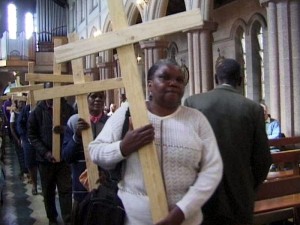
Report Cover Photo: Procession with crosses to commemorate those who have died in political violence since 2000 in Zimbabwe: 29 June 2002, St Mary’s Cathedral, Bulawayo
The Solidarity Peace Trust has a Board consisting of church leaders of Southern Africa and is dedicated to promoting the rights of victims of human rights abuses in Zimbabwe. The Trust was founded in 2003. The Chairperson is Catholic Archbishop Pius Ncube of Bulawayo, and the Vice Chairperson is Anglican Bishop Rubin Phillip of Kwazulu Natal.
In August and September of this year, The Solidarity Peace Trust organised for ten priests and pastors from South African parishes to spend a fortnight in Zimbabwe. The priests came from Kwazulu Natal, Gauteng and Cape Town, and were billeted with Zimbabwean priests in urban centres around the country. (Read more…)
Mon, December 15 2003 » 2003, Church commentators, Elections, Human rights, Reports » Leave a comment





